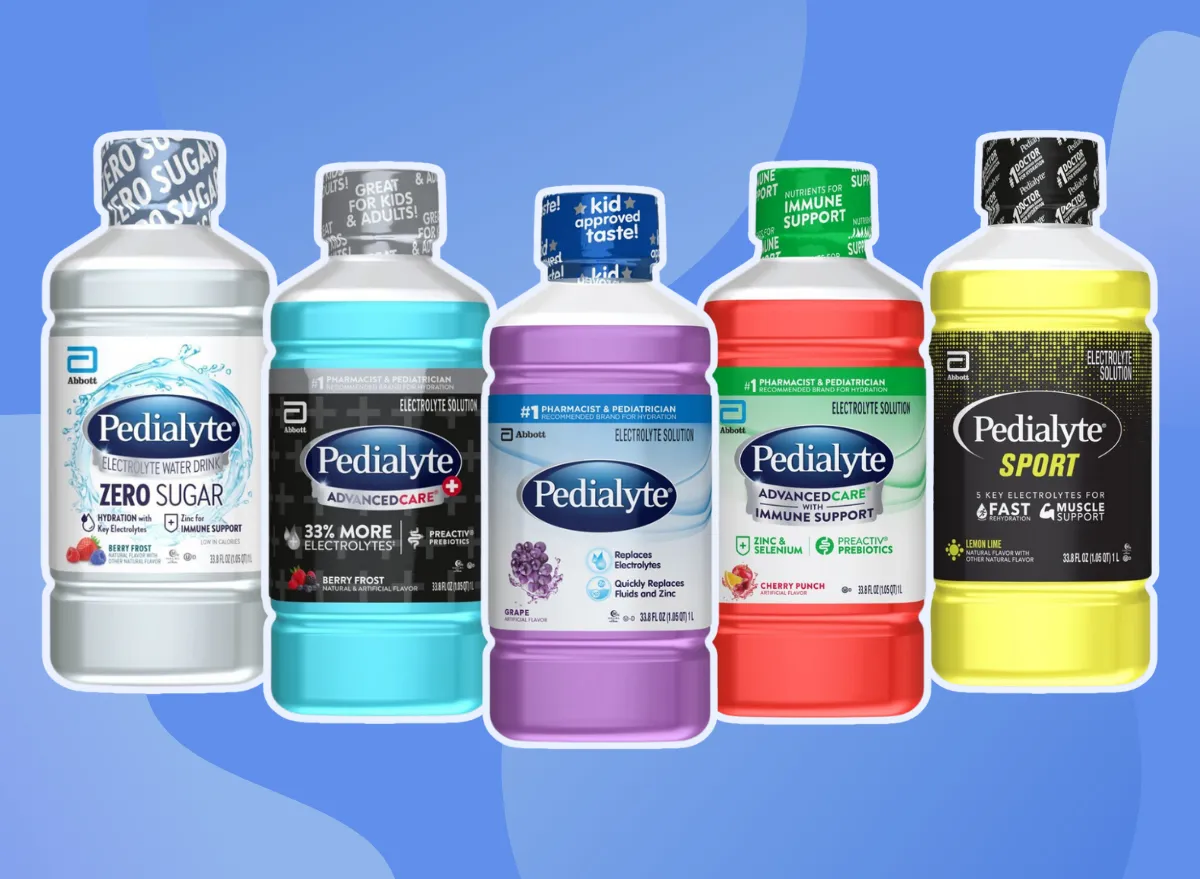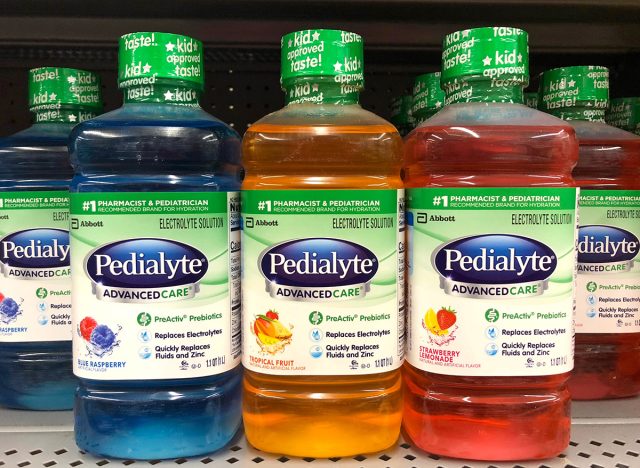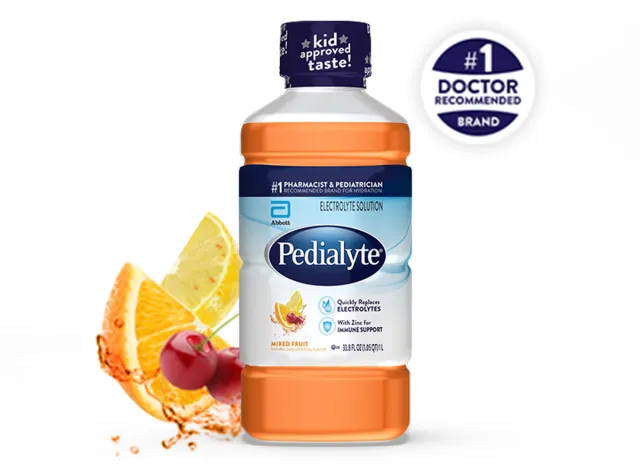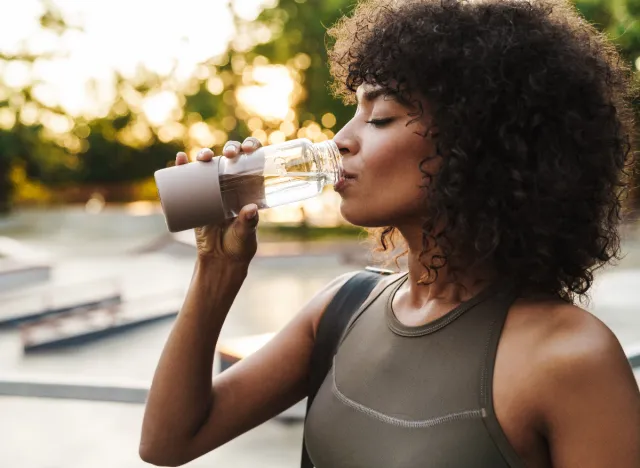What Happens To Your Body When You Drink Pedialyte as an Adult

Once developed to treat dehydration in children, Pedialyte has gained popularity among adults. Whether it's being used to combat dehydration after a challenging workout, recover from an illness, or relieve hangover symptoms, many adults now turn to Pedialyte as a quick fix for dehydration.
But what exactly is Pedialyte, and how does it affect adult health? Read on to learn about the potential benefits and drawbacks of drinking Pedialyte as an adult so you can decide whether it's the right choice for you or if you should opt for a different electrolyte drink.
What is Pedialyte?

Pedialyte is an oral rehydration drink originally designed to treat dehydration from nausea and vomiting, especially in children. However, the brand has expanded beyond infant hydration, now offering products like sports drinks and immune support options. Unlike many sports drinks or sugary beverages, many varieties of Pedialyte are lower in sugar and higher in electrolytes.
There are many different types of Pedialyte, including:
- AdvancedCare Plus (with 33% more electrolytes).
- Sport (formulated with five key electrolytes).
- AdvancedCare (with PreActiv prebiotics to promote digestive health).
- Immune Support
- Classic
- Electrolyte Water (with three key electrolytes, zero sugar, no colors, no artificial flavors).
- Fast Hydration (with an optimal balance of glucose and electrolytes).
- Organic (with no artificial colors, sweeteners, or flavors).
- Half Liters
You can also get Pedialyte drink mix, which is a powder you mix with water.
Pedialyte Nutrition
Here is the nutrition information for Classic Pedialyte:
Calories: 45
Fat: 0 g (Saturated Fat: 0 g)
Sodium: 370 mg
Carbs: 12 g (Fiber: 0 g, Sugar: 9 g)
Protein: 0 g
Potassium: 280 mg
Chloride: 440 mg
Zinc: 2.8 mg
This Pedialyte drink is low in calories, with 45 per 12-ounce serving, and contains an electrolyte blend of sodium, potassium, and chloride to support hydration. It provides 16% of the daily value (DV) for sodium, 6% DV for potassium, and 19% DV for chloride, with 9 grams of added sugar to aid electrolyte absorption without excess sweetness. Zinc is also included, offering 25% of the DV to support immune function.
Pedialyte Ingredients
Pedialyte contains water, dextrose (a form of glucose, which is a type of sugar) and a blend of electrolytes, including potassium citrate, sodium chloride (salt), and sodium citrate. Depending on the flavor and type, it may also contain additional vitamins and minerals, preservatives, and artificial flavors, colors, and sweeteners, such as sucralose and acesulfame-K.
For example, Pedialyte Sport Berry Freeze contains water, dextrose, galactooligosaccharides, salt, potassium citrate, citric acid, natural and artificial flavors, potassium phosphate, magnesium chloride, sodium citrate, sucralose, acesulfame potassium, and red 40.
Benefits of Drinking Pedialyte as an Adult

There are several benefits of drinking Pedialyte as an adult.
Supports Recovery from Illness
During illnesses that include bouts of vomiting or diarrhea, it's easy to lose fluid and electrolytes, which can worsen symptoms and make recovery take longer. Pedialyte can be beneficial for adults recovering from a stomach bug or food poisoning because it can help restore essential minerals like sodium and potassium while also providing fluids to prevent further dehydration.
While many adults choose to use sports drinks like Gatorade when they have a stomach bug, the high sugar content of sports drinks could worsen diarrhea. Pedialyte is lower in sugar than sports drinks, making it a better choice for treating dehydration due to vomiting or diarrhea.
May Help Relieve Hangover Symptoms
Drinking Pedialyte after a night of drinking alcohol may help relieve hangover symptoms by replenishing lost fluids and electrolytes. Alcohol can lead to dehydration, and Pedialyte can help address symptoms related to dehydration, like headaches, dry mouth, and fatigue.
Supports Exercise Recovery
During intense physical activity, the body can lose significant amounts of fluids and electrolytes through sweat. Pedialyte offers a quick way to rehydrate and restore electrolyte balance, which may help prevent muscle cramps, fatigue, and dizziness that can occur post-workout.
While Classic Pedialyte can be an effective post-workout recovery drink, Pedialyte also makes a Sport version specifically designed for post-workout rehydration. The Sport version has three times the electrolytes and one-quarter of the sugar of the leading sports drinks. It contains five electrolytes—sodium, chloride, potassium, magnesium, and phosphate—to promote fluid balance and muscle repair.
Potential Drawbacks

While Pedialyte can be a good hydration choice in some situations, there are some potential drawbacks.
Excess Sodium
While lower in sugar than many sports drinks, Pedialyte contains more sodium than drinking plain water and some other hydration options. Regular consumption could contribute to an excessive intake of sodium, which may not be ideal for those with high blood pressure or those watching their sodium intake.
For reference, the American Heart Association recommends consuming no more than 2,300 milligrams of sodium daily. Classic Pedialyte contains 370 milligrams of sodium per 12-ounce serving, which accounts for 16% of the daily limit. The sodium can add up quickly if you consume multiple servings daily; however, this is generally not a concern when Pedialyte is used for its intended purposes, such as rehydration after illness or intense physical activity.
Not a Replacement for Balanced Nutrition
Pedialyte is designed to address dehydration, not to provide comprehensive nutritional support. Adults relying too heavily on Pedialyte for hydration might miss out on the benefits of water, which has no added sugars or electrolytes. Pedialyte also doesn't contain any protein, so it should not be a person's sole source of nutrition.
May Not Be Necessary for Mild Dehydration
For adults experiencing mild dehydration from day-to-day activities, Pedialyte may not be necessary. In such cases, adequate water and a balanced diet may be enough to maintain proper hydration and electrolyte balance.
When Should Adults Consider Drinking Pedialyte

Adults might consider drinking Pedialyte during or after intense physical activity, especially in hot weather, to prevent or treat dehydration.
Pedialyte can also be helpful during illness, especially if symptoms like vomiting or diarrhea lead to significant fluid loss.
Finally, it may serve as a hangover remedy to quickly restore fluids after a night out.
Alternatives to Pedialyte for Adults

Coconut water is a natural option that provides electrolytes and hydration without artificial ingredients or artificial sweeteners. Coconut water contains around 45 calories, 6 grams of sugar, 60 milligrams of magnesium, 600 milligrams of potassium, and 250 milligrams of sodium per one-cup serving.
For those looking for a homemade oral rehydration solution, mix four and a quarter cups of water with half a teaspoon of salt and two tablespoons of sugar to create a simple rehydration drink. Alternatively, mix three-quarters of a cup of apple juice with three and a quarter cups of water and half to three-quarters of a teaspoon of salt. These homemade rehydration drinks can work in a pinch, but may not taste as good as oral rehydration drinks like Pedialyte thanks to their salt content.
Final Thoughts
While Pedialyte was originally developed to treat dehydration in children, it has grown in popularity among adults to help rehydrate after intense exercise, illness, and even hangovers. With its electrolyte-rich formula, it can provide quick rehydration when needed.
However, it's important to be mindful of its sodium content and recognize that it's not a replacement for a balanced diet and drinking enough water. For mild dehydration, a balanced diet and water may be more suitable. Coconut water is another good alternative for those seeking a more natural option.
Drinking Pedialyte without a specific need can lead to excessive sodium intake, which could be concerning for people with high blood pressure or kidney issues. For day-to-day hydration, it's best to stick with water.
- Source: https://pubmed.ncbi.nlm.nih.gov/30916313/
- Source: https://www.journalofsports.com/pdf/2021/vol6issue2/PartF/6-2-150-885.pdf
- Source: https://www.heart.org/en/healthy-living/healthy-eating/eat-smart/sodium/how-much-sodium-should-i-eat-per-day
- Source: https://www.albertahealthservices.ca/assets/info/nutrition/if-nfs-ors-recipes.pdf









